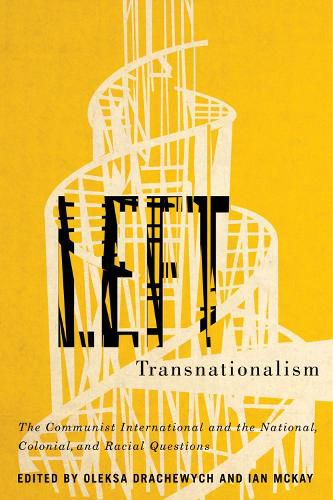Readings Newsletter
Become a Readings Member to make your shopping experience even easier.
Sign in or sign up for free!
You’re not far away from qualifying for FREE standard shipping within Australia
You’ve qualified for FREE standard shipping within Australia
The cart is loading…






This title is printed to order. This book may have been self-published. If so, we cannot guarantee the quality of the content. In the main most books will have gone through the editing process however some may not. We therefore suggest that you be aware of this before ordering this book. If in doubt check either the author or publisher’s details as we are unable to accept any returns unless they are faulty. Please contact us if you have any questions.
In 1919, Bolshevik Russia and its followers formed the Communist International, also known as the Comintern, to oversee the global communist movement. From the very beginning, the Comintern committed itself to ending world imperialism, supporting colonial liberation, and promoting racial equality. Coinciding with the centenary of the Comintern’s founding, Left Transnationalism highlights the different approaches interwar communists took in responding to these issues. Bringing together leading and emerging scholars on the Communist International, individual communist parties, and national and colonial questions, this collection moves beyond the hyperpoliticized scholarship of the Cold War era and re-energizes the field. Contributors focus on transnational diasporic and cultural networks, comparative studies of key debates on race and anti-colonialism, the internationalizing impulse of the movement, and the evolution of communist platforms through transnational exchange. Essays further emphasize the involvement of communist and socialist parties across Canada, Australia, India, China, Japan, Southeast Asia, Latin America, South Africa, and Europe. Highlighting the active discussions on nationality, race, and imperialism that took place in Comintern circles, Left Transnationalism demonstrates that this organization - as well as communism in general - was, especially in the years before 1935, far more heterogeneous, creative, and unpredictable than the rubber stamp of the Soviet Union described in conventional historiography. Contributors include Michel Beaulieu (Lakehead University), Marc Becker (Truman State University), Anna Belogurova (Freie Universitat Berlin), Oleksa Drachewych (University of Guelph), Daria Dyakonova (Universite de Montreal), Alastair Kocho-Williams (Clarkson University), Andree Levesque (McGill University), Lars T. Lih (Independent Scholar), Ian McKay (McMaster University), Sandra Pujals (University of Puerto Rico), John Riddell (Ontario Institute of Studies in Education), Evan Smith (Flinders University), S.A. Smith (All Souls College, Oxford), Xiaofei Tu (Appalachian State University), and Kankan Xie (Peking University).
$9.00 standard shipping within Australia
FREE standard shipping within Australia for orders over $100.00
Express & International shipping calculated at checkout
This title is printed to order. This book may have been self-published. If so, we cannot guarantee the quality of the content. In the main most books will have gone through the editing process however some may not. We therefore suggest that you be aware of this before ordering this book. If in doubt check either the author or publisher’s details as we are unable to accept any returns unless they are faulty. Please contact us if you have any questions.
In 1919, Bolshevik Russia and its followers formed the Communist International, also known as the Comintern, to oversee the global communist movement. From the very beginning, the Comintern committed itself to ending world imperialism, supporting colonial liberation, and promoting racial equality. Coinciding with the centenary of the Comintern’s founding, Left Transnationalism highlights the different approaches interwar communists took in responding to these issues. Bringing together leading and emerging scholars on the Communist International, individual communist parties, and national and colonial questions, this collection moves beyond the hyperpoliticized scholarship of the Cold War era and re-energizes the field. Contributors focus on transnational diasporic and cultural networks, comparative studies of key debates on race and anti-colonialism, the internationalizing impulse of the movement, and the evolution of communist platforms through transnational exchange. Essays further emphasize the involvement of communist and socialist parties across Canada, Australia, India, China, Japan, Southeast Asia, Latin America, South Africa, and Europe. Highlighting the active discussions on nationality, race, and imperialism that took place in Comintern circles, Left Transnationalism demonstrates that this organization - as well as communism in general - was, especially in the years before 1935, far more heterogeneous, creative, and unpredictable than the rubber stamp of the Soviet Union described in conventional historiography. Contributors include Michel Beaulieu (Lakehead University), Marc Becker (Truman State University), Anna Belogurova (Freie Universitat Berlin), Oleksa Drachewych (University of Guelph), Daria Dyakonova (Universite de Montreal), Alastair Kocho-Williams (Clarkson University), Andree Levesque (McGill University), Lars T. Lih (Independent Scholar), Ian McKay (McMaster University), Sandra Pujals (University of Puerto Rico), John Riddell (Ontario Institute of Studies in Education), Evan Smith (Flinders University), S.A. Smith (All Souls College, Oxford), Xiaofei Tu (Appalachian State University), and Kankan Xie (Peking University).